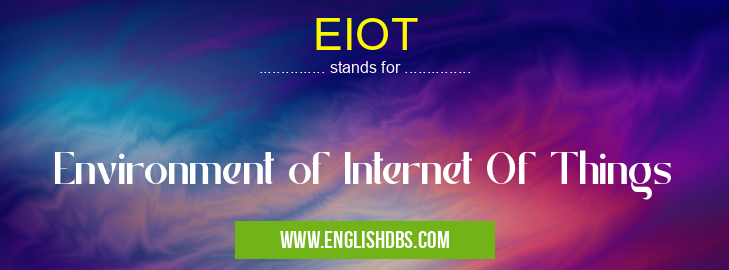What does EIOT mean in ELECTRONICS
The Environment of Internet of Things (EIOT) encompasses the surroundings and conditions in which Internet of Things (IoT) devices and systems operate. It includes the physical infrastructure, network connectivity, data management, and security measures that enable the deployment and operation of IoT technologies.

EIOT meaning in Electronics in Academic & Science
EIOT mostly used in an acronym Electronics in Category Academic & Science that means Environment of Internet Of Things
Shorthand: EIOT,
Full Form: Environment of Internet Of Things
For more information of "Environment of Internet Of Things", see the section below.
EIOT Meaning
EIOT stands for:
- E: Environment
- I: Internet
- O: of
- T: Things
EIOT Full Form
The full form of EIOT is Environment of Internet of Things.
Importance of EIOT
The EIOT is crucial for the effective functioning of IoT systems. It ensures that devices can connect to networks, exchange data securely, and interact with each other and external systems. The EIOT also provides the necessary infrastructure and protocols for managing and analyzing the vast amounts of data generated by IoT devices.
Key Components of EIOT
- Physical Infrastructure: Includes devices, sensors, gateways, and other hardware components that make up the IoT network.
- Network Connectivity: Provides the means for IoT devices to communicate with each other and with the internet.
- Data Management: Involves storing, processing, and analyzing data generated by IoT devices.
- Security Measures: Protects data and devices from unauthorized access, cyber threats, and privacy concerns.
Essential Questions and Answers on Environment of Internet Of Things in "SCIENCE»ELECTRONICS"
What is the Environment of Internet of Things (EIOT)?
The Environment of Internet of Things (EIOT) refers to the physical and virtual ecosystem surrounding connected devices, sensors, actuators, and other components that constitute the Internet of Things (IoT). It encompasses the infrastructure, communication networks, data platforms, and applications that support the collection, analysis, and utilization of data generated by IoT devices.
How does EIOT impact various industries?
EIOT has significant implications across diverse industries. In manufacturing, it enables real-time monitoring, predictive maintenance, and automated processes. In healthcare, it facilitates remote patient monitoring, personalized medicine, and improved medical device interoperability. In agriculture, it optimizes crop yields, water management, and livestock welfare. In smart cities, EIOT supports infrastructure management, traffic optimization, and environmental monitoring.
What are the benefits of EIOT for businesses?
Businesses can leverage EIOT to streamline operations, improve decision-making, enhance customer experiences, and gain competitive advantages. It provides real-time visibility into operations, enables predictive analytics, and automates tasks. By harnessing data from IoT devices, businesses can optimize processes, reduce costs, and drive innovation.
What are the challenges associated with EIOT implementation?
EIOT implementation faces several challenges, including data security and privacy concerns, interoperability issues, and the need for robust infrastructure. Ensuring the security of IoT devices and the data they generate is crucial. Interoperability challenges arise due to the proliferation of different IoT protocols and devices. Additionally, the extensive data generated by IoT devices requires scalable and reliable infrastructure for storage and processing.
What are the key considerations for successful EIOT deployment?
Successful EIOT deployment requires careful planning and execution. Key considerations include defining business objectives, selecting appropriate IoT devices and platforms, ensuring data security, addressing interoperability challenges, and building a strong team with expertise in IoT, data analytics, and application development. Collaboration with industry partners and the adoption of best practices can further enhance the effectiveness of EIOT implementation.
Final Words: The Environment of Internet of Things (EIOT) is an essential aspect of IoT deployments. It provides the foundation for connecting devices, managing data, and ensuring security. By understanding the EIOT, organizations can develop and implement robust IoT solutions that meet their specific requirements.
